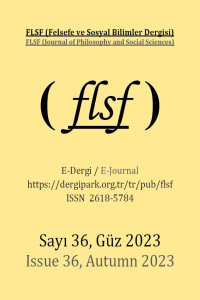Abstract
Bu çalışmanın temel amacı, John Rawls’un suçluluk ve utanç hakkındaki görüşlerini incelemek ve ahlaki gelişim teorisi ile istikrar sorunu arasındaki ilişkiyi kısaca gözden geçirmektir. Öncelikle konunun tam olarak ortaya konabilmesi için Etik’te ahlaki duygular üzerine geliştirilen temel görüşlerin ana hatlarıyla ortaya konması önemlidir. Bu nedenle, çalışmanın ilk bölümünde Jonathan Haidt tarafından geliştirilen dört ahlaki duygu ailesi ve utanç ile suçluluk arasındaki temel farklılıklar incelenecektir. İkinci bölümde John Rawls’ın ahlaki suçluluk duygusunun gelişimine ilişkin teorisi ve utanç üzerine düşünceleri incelenecektir. Çalışmanın son bölümünde ise Rawls’un bireylerin ahlaki gelişimine ilişkin teorisi ve istikrar sorunuyla bağlantılı olarak adalet duygusu edinmenin önkoşulları ana hatlarıyla incelenecektir.
References
- De Sousa, Ronald, “Moral Emotions”, Springer. Ethical Theory and Moral Practice, Vol. 4, No. 2, Cultivating Emotions, 2001, 109-126.
- Deigh, John, “Shame and Self-Esteem: A Critique”, Ethics, Vol. 93, No. 2. The University of Chicago Press, 1983, 225-245.
- Haidt, Jonathan, “The Moral Emotions”, R. J. Davidson, K. R. Scherer, & H. H. Goldsmith (Eds.) Handbook of affective sciences. Oxford: Oxford University Press. 2003, 852-870.
- Lindsay-Hartz, Janice, “Contrasting Experiences of Shame and Guilt”, 1984 American Behavioral Scientist, Vol. 27 No.6, Sage Publications, Inc. July/August 1984, 689-704.
- Nussbaum, Martha C., “Conversing with the Tradition: John Rawls and the History of Ethics”, Ethics, The University of Chicago. January, 1999, 424-430.
- O’Hear, Anthony, “Guilt and Shame as Moral Concepts”, Proceedings of the Aristotelian Society, New Series, Vol. 77, Oxford University Press on behalf of The Aristotelian Society. 1976 – 1977, 73-86.
- Rawls, John, A Theory of Justice, Revised Edition. Cambridge, Massachusetts. The Belknap press of Harvard University Press. 1999.
- Rawls, John, “The Sense of Justice”, The Philosophical Review, Vol. 72, No. 3, Duke University Press on behalf of Philosophical Review. July, 1963, 281-305.
- Teroni, Fabrice and Bruun, Otto, “Shame, Guilt and Morality”, Journal of Moral Philosophy, 8, Koninklijke Brill NV, 2011, 223-245.
- Velleman, J. David, “Don’t Worry, Feel Guilty”, in Philosophy and the Emotions. Royal Institute of Philosophy Supplement, 52, ed. Anthony Hatzimoysis. Cambridge University Press. March, 2003.
- Wang, Xinghua, “Rousseauian Heritage of Rawls’s Moral Psychology”, Synthesis Philosophica. 67. 1/2019, 207–220.
Abstract
The main purpose of this work is to examine John Rawls’ views on guilt and shame, as well as briefly review the relationship between his theory of moral development and the problem of stability. First of all, in order to fully reveal the subject, it is important to outline the central views on moral emotions developed in Ethics. So, in the first part of the work, four families of moral emotions developed by Jonathan Haidt and the principal differences between shame and guilt will be studied. The second part will examine John Rawls’ theory of the development of the moral sense of guilt, as well as his reflections on shame. In the final part of the work, Rawls’ theory of the moral development of individuals and the prerequisites for acquiring a sense of justice in conjunction with the problem of stability will be studied in main terms.
Keywords
John Rawls moral emotions guilt shame moral development the sense of justice the problem of stability
References
- De Sousa, Ronald, “Moral Emotions”, Springer. Ethical Theory and Moral Practice, Vol. 4, No. 2, Cultivating Emotions, 2001, 109-126.
- Deigh, John, “Shame and Self-Esteem: A Critique”, Ethics, Vol. 93, No. 2. The University of Chicago Press, 1983, 225-245.
- Haidt, Jonathan, “The Moral Emotions”, R. J. Davidson, K. R. Scherer, & H. H. Goldsmith (Eds.) Handbook of affective sciences. Oxford: Oxford University Press. 2003, 852-870.
- Lindsay-Hartz, Janice, “Contrasting Experiences of Shame and Guilt”, 1984 American Behavioral Scientist, Vol. 27 No.6, Sage Publications, Inc. July/August 1984, 689-704.
- Nussbaum, Martha C., “Conversing with the Tradition: John Rawls and the History of Ethics”, Ethics, The University of Chicago. January, 1999, 424-430.
- O’Hear, Anthony, “Guilt and Shame as Moral Concepts”, Proceedings of the Aristotelian Society, New Series, Vol. 77, Oxford University Press on behalf of The Aristotelian Society. 1976 – 1977, 73-86.
- Rawls, John, A Theory of Justice, Revised Edition. Cambridge, Massachusetts. The Belknap press of Harvard University Press. 1999.
- Rawls, John, “The Sense of Justice”, The Philosophical Review, Vol. 72, No. 3, Duke University Press on behalf of Philosophical Review. July, 1963, 281-305.
- Teroni, Fabrice and Bruun, Otto, “Shame, Guilt and Morality”, Journal of Moral Philosophy, 8, Koninklijke Brill NV, 2011, 223-245.
- Velleman, J. David, “Don’t Worry, Feel Guilty”, in Philosophy and the Emotions. Royal Institute of Philosophy Supplement, 52, ed. Anthony Hatzimoysis. Cambridge University Press. March, 2003.
- Wang, Xinghua, “Rousseauian Heritage of Rawls’s Moral Psychology”, Synthesis Philosophica. 67. 1/2019, 207–220.
Details
| Primary Language | English |
|---|---|
| Journal Section | Research Article |
| Authors | |
| Publication Date | November 27, 2023 |
| Submission Date | June 8, 2023 |
| Acceptance Date | November 3, 2023 |
| Published in Issue | Year 2023 Issue: 36 |
Starting from 2024, our journal will be published in 3 issues as two regular and one special issues. These issues will be published In May (regular issue), September (special issue) and December (regular issue).
Only articles within the scope of the file will be included in our special issue.
Thank you for your attention.

